

Dell Hybrid Management: Azure Policies for HCI Compliance and Remediation
Mon, 30 May 2022 17:05:47 -0000
|Read Time: 0 minutes
Dell Hybrid Management: Azure Policies for HCI Compliance and Remediation
Companies that take an “Azure hybrid first” strategy are making a wise and future-proof decision by consolidating the advantages of both worlds—public and private—into a single entity.
Sounds like the perfect plan, but a key consideration for these environments to work together seamlessly is true hybrid configuration consistency.
A major challenge in the past was having the same level of configuration rules concurrently in Azure and on-premises. This required different tools and a lot of costly manual interventions (subject to human error) that resulted, usually, in potential risks caused by configuration drift.
But those days are over.
We are happy to introduce Dell HCI Configuration Profile (HCP) Policies for Azure, a revolutionary and crucial differentiator for Azure hybrid configuration compliance.
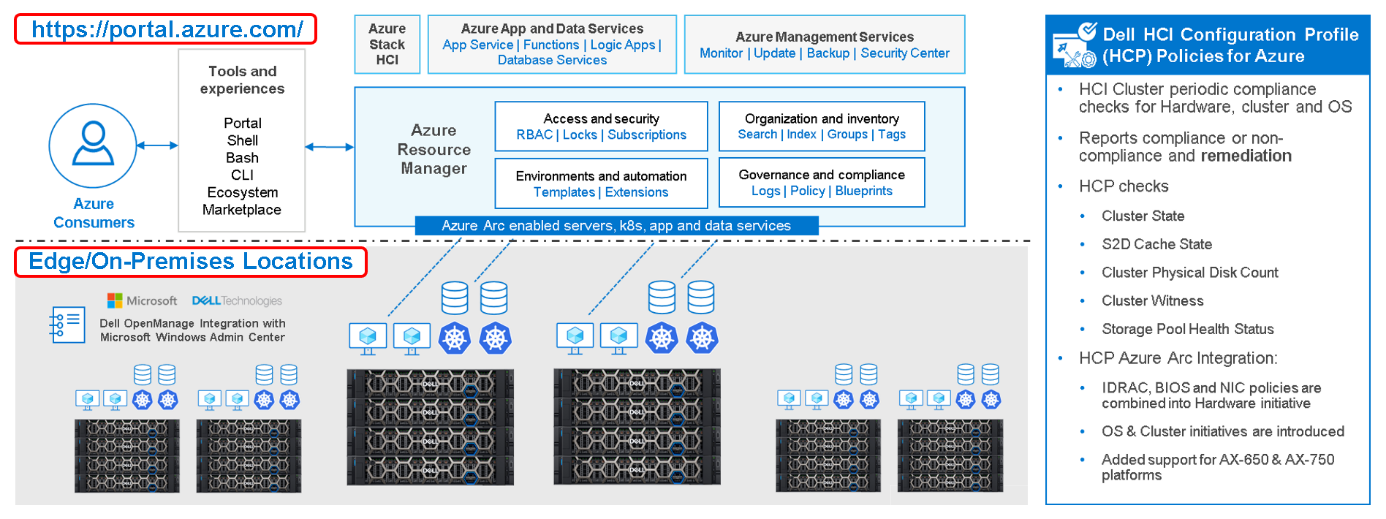
Figure 1: Dell Hybrid Management with Windows Admin Center (local) and Azure/Azure Arc (public)
So, what is it? How does it work? What value does it provide?
Dell HCP Policies for Azure is our latest development for Dell OpenManage Integration with Windows Admin Center (OMIMSWAC). With it, we can now integrate Dell HCP policy definitions into Azure Policy. Dell HCP is the specification that captures the best practices and recommended configurations for Azure Stack HCI and Windows-based HCI solutions from Dell to achieve better resiliency and performance with Dell HCI solutions.
The HCP Policies feature functions at the cluster level and is supported for clusters that are running Azure Stack HCI OS (21H2) and pre-enabled for Windows Server 2022 clusters.
IT admins can manage Azure Stack HCI environments through two different approaches:
- At-scale through the Azure portal using the Azure Arc portfolio of technologies
- Locally on-premises using Windows Admin Center
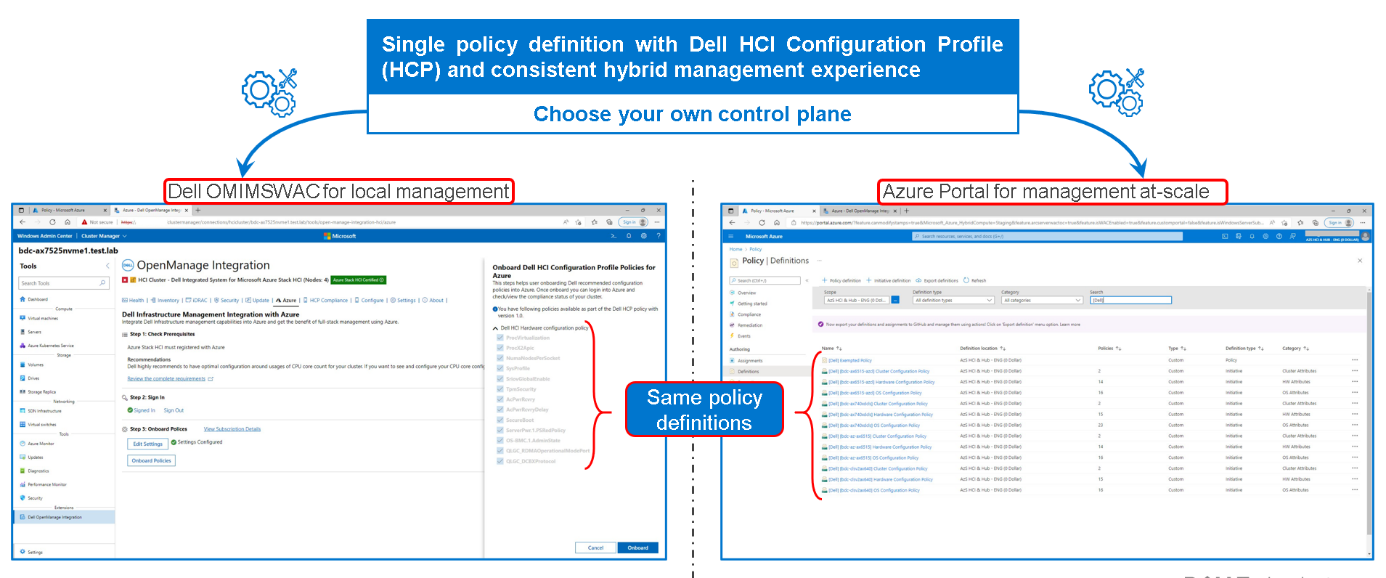
Figure 2: Dell HCP Policies for Azure - onboarding Dell HCI Configuration Profile
By using a single Dell HCP policy definition, both options provide a seamless and consistent management experience.
Running Check Compliance automatically compares the recommended rules packaged together in the Dell HCP policy definitions with the settings on the running integrated system. These rules include configurations that address the hardware, cluster symmetry, cluster operations, and security.

Figure 3: Dell HCP Policies for Azure - HCP policy compliance
Dell HCP Policy Summary provides the compliance status of four policy categories:
- Dell Infrastructure Lock Policy - Indicates enhanced security compliance to protect against unintentional changes to infrastructure
- Dell Hardware Configuration Policy - Indicates compliance with Dell recommended BIOS, iDRAC, firmware, and driver settings that improve cluster resiliency and performance
- Dell Hardware Symmetry Policy - Indicates compliance with integrated-system validated components on the support matrix and best practices recommended by Dell and Microsoft
- Dell OS Configuration Policy - Indicates compliance with Dell recommended operating system and cluster configurations
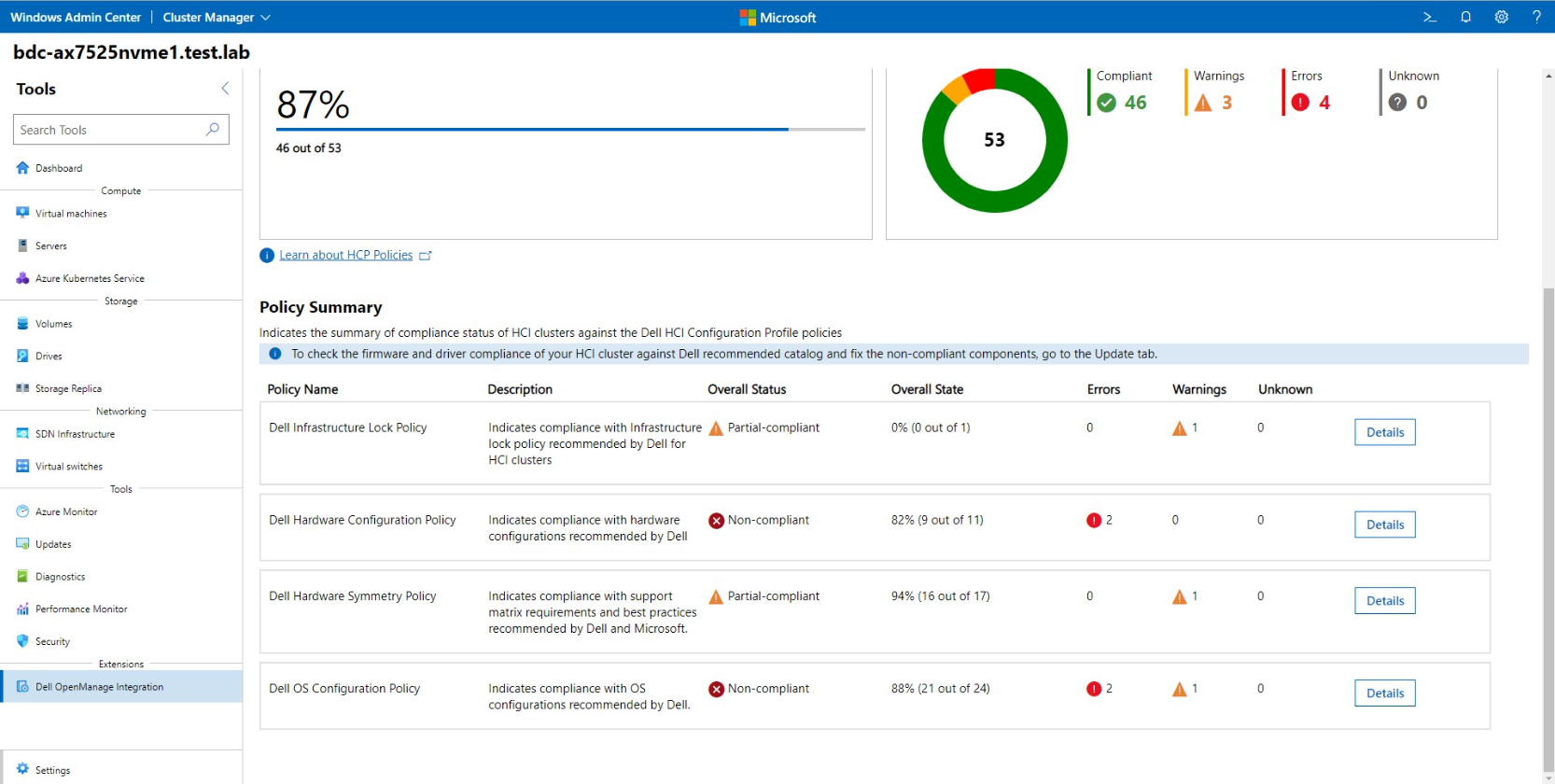
Figure 4: Dell HCP Policies for Azure - HCP Policy Summary
To re-align non-compliant policies with the best practices validated by Dell Engineering, our Dell HCP policy remediation integration with WAC (unique at the moment) helps to fix any non-compliant errors. Simply click “Fix Compliance.”

Figure 5: Dell HCP Policies for Azure - HCP policy remediation
Some fixes may require manual intervention; others can be corrected in a fully automated manner using the Cluster-Aware Updating framework.
Conclusion
The “Azure hybrid first” strategy is real today. You can use Dell HCP Policies for Azure, which provides a single-policy definition with Dell HCI Configuration Profile and a consistent hybrid management experience, whether you use Dell OMIMSWAC for local management or Azure Portal for management at-scale.
With Dell HCP Policies for Azure, policy compliance and remediation are fully covered for Azure and Azure Stack HCI hybrid environments.
You can see Dell HCP Policies for Azure in action at the interactive Dell Demo Center.
Thanks for reading!
Author: Ignacio Borrero, Dell Senior Principal Engineer CI & HCI, Technical Marketing
Twitter: @virtualpeli
Related Blog Posts

Experts Recommend Automation for a Healthier Lifestyle
Wed, 20 Oct 2021 19:59:25 -0000
|Read Time: 0 minutes
Like any good techie, I can get a little obsessed with gadgets that improve my quality of life. Take, for example, my recent discovery of wearable technology that eases the symptoms of motion sickness. For most of my life, I’ve had to take over-the-counter or prescription medicine when boating, flying, and going on road trips. Then, I stumbled across a device that I could wear around my wrist that promised to solve the problem without the side effects. Hesitantly, I bought the device and asked a friend to drive like a maniac around town while I sat in the back seat. It actually worked – no headache, no nausea, and no grogginess from meds! Needless to say, I never leave home without my trusty gizmo to keep motion sickness at bay.

Throughout my career in managing IT infrastructure, stress has affected my quality of life almost as much as motion sickness. There is one responsibility that has always caused more angst than anything else: lifecycle management (LCM). To narrow that down a bit, I’m specifically talking about patching and updating IT systems under my control. I have sometimes been derelict in my duties because of annoying manual steps that distract me from working on the fun, highly visible projects. It’s these manual steps that can cause the dreaded DU/DL (data unavailable or data loss) to rear its ugly head. Can you say insomnia?
Innovative technology to the rescue once again! While creating a demo video last year for our Dell EMC OpenManage Integration with Microsoft Windows Admin Center (OMIMSWAC), I was blown away by how easy we made the BIOS, firmware, and driver updates on clusters. The video did a pretty good job of showing the power of the Cluster-Aware Updating (CAU) feature, but it didn’t go far enough. I needed to quantify its full potential to change an IT profressional’s life by pitting an OMIMSWAC’s automated, CAU approach against a manual, node-based approach. I captured the results of the bake off in Dell EMC HCI Solutions for Microsoft Windows Server: Lifecycle Management Approach Comparison.

Automation Triumphs!
For this white paper to really stand the test of time, I knew I needed to be very clever to compare apples-to-apples. First, I referred to HCI Operations Guide—Managing and Monitoring the Solution Infrastructure Life Cycle, which detailed the hardware updating procedures for both the CAU and node-based approaches. Then, I built a 4-node Dell EMC HCI Solutions for Windows Server 2019 cluster, performed both update scenarios, and recorded the task durations. We all know that automation is king, but I didn’t expect the final tally to be quite this good:
- The automated approach reduced the number of steps in the process by 82%.
- The automated approach required 90% less of my focused attention. In other words, I was able to attend to other duties while the updates were installing.
- If I was in a production environment, the maintenance window approved by the change control board would have been cut in half.
- The automated process left almost no opportunity for human error.
As you can see from the following charts taken from the paper, these numbers only improved as I extrapolated them out to the maximum Windows Server HCI cluster size of 16 nodes.
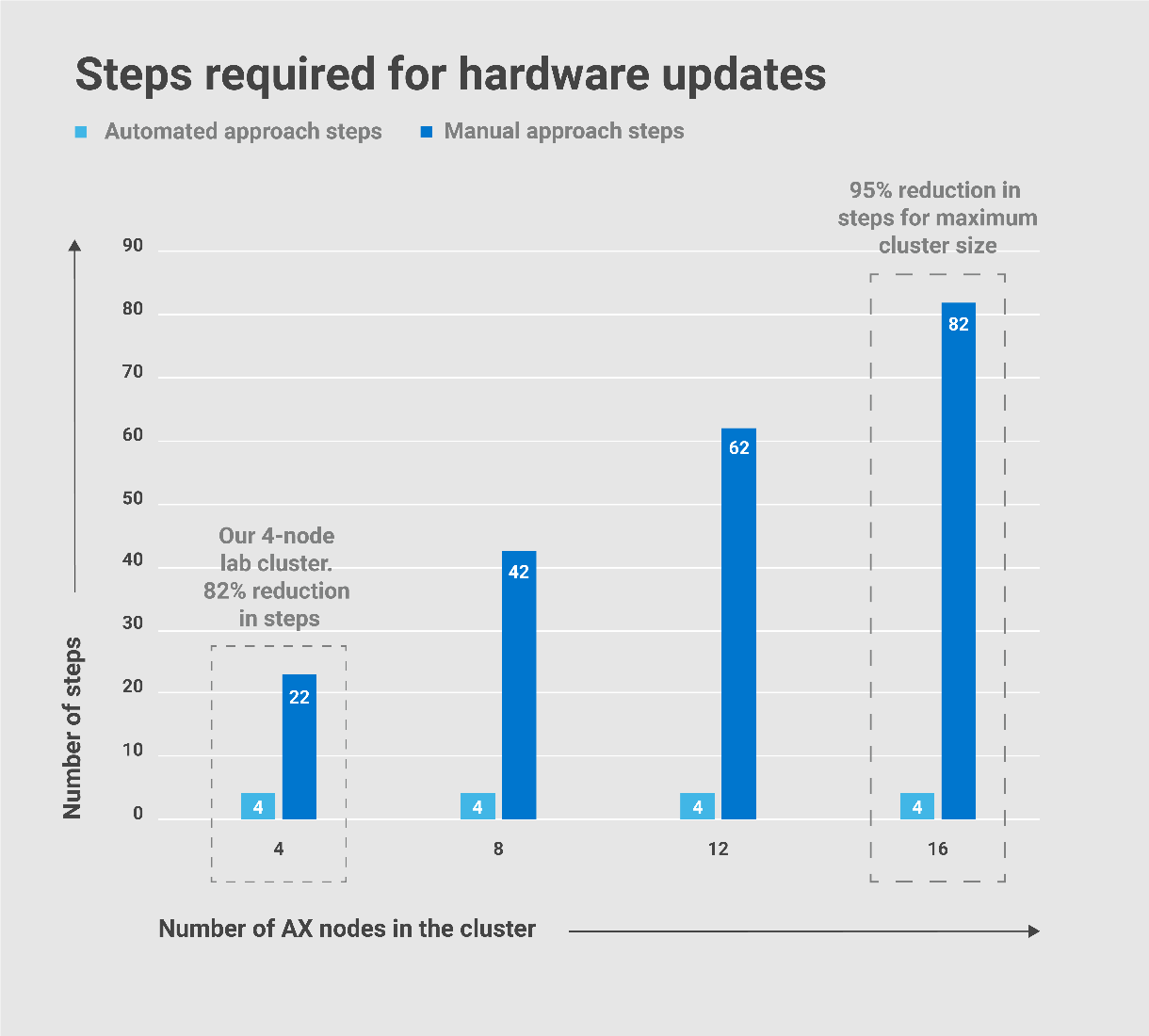
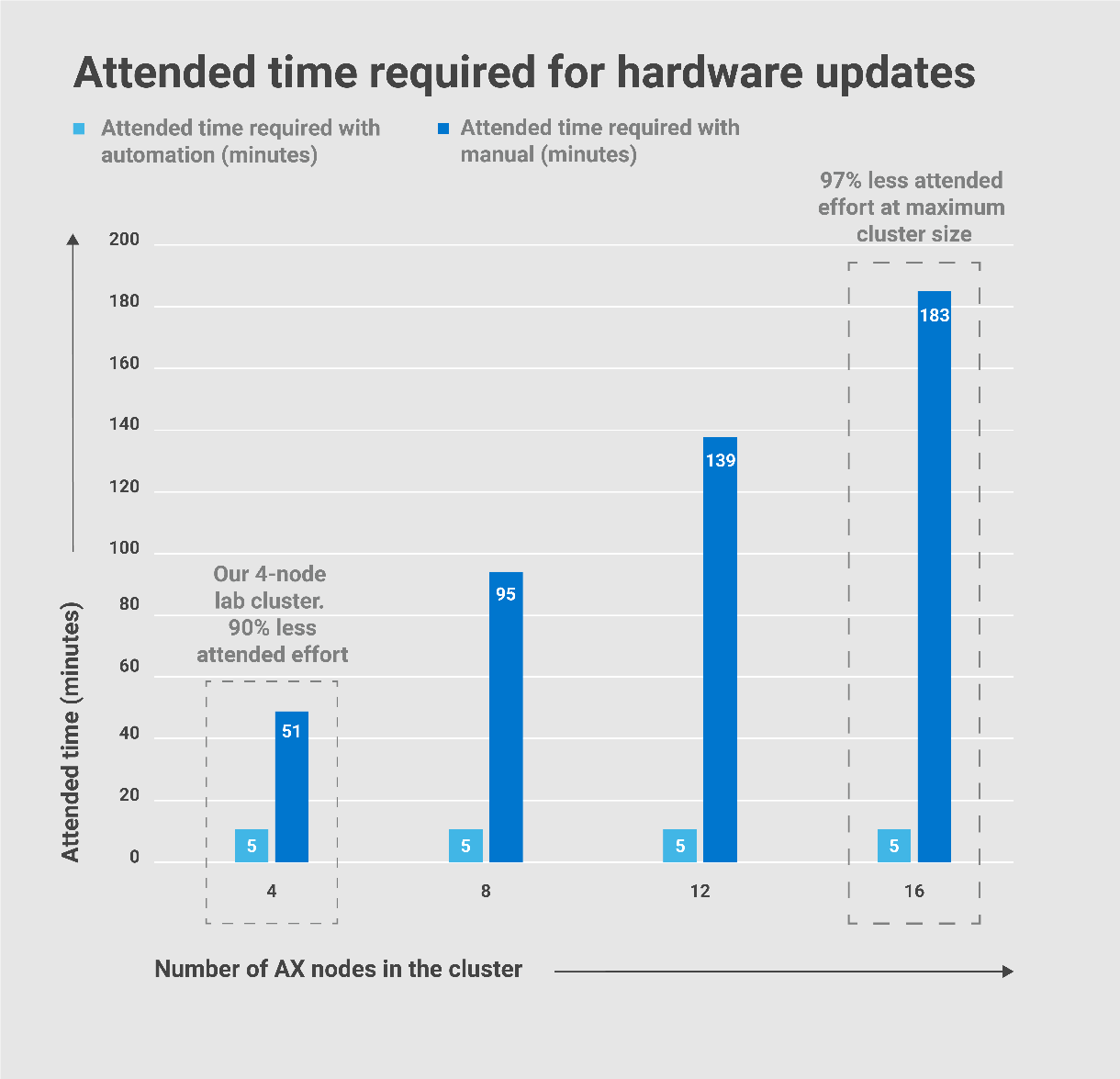
I thought these results were too good to be true, so I checked my steps about 10 times. In fact, I even debated with my Marketing and Product Management counterparts about sharing these claims with the public! I could hear our customers saying, “Oh, yeah, right! These are just marketecture hero numbers.” But in this case, I collected the hard data myself. I am still confident that these results will stand up to any scrutiny. This is reality – not dreamland!
Just when I thought it couldn’t get any better
So why am I blogging about a project I did last year? Just when I thought the testing results in the white paper couldn’t possibly get any better, Dell EMC Integrated System for Microsoft Azure Stack HCI came along. Azure Stack HCI is Microsoft’s purpose-built operating system delivered as an Azure service. The current release when writing this blog was Azure Stack HCI, version 20H2. Our Solution Brief provides a great overview of our all-in-one validated HCI system, which delivers efficient operations, flexible consumption models, and end-to-end enterprise support and services. But what I’m most excited about are two lifecycle management enhancements – 1-click full stack LCM and Kernel Soft Reboot – that will put an end to the old adage, “If it looks too good to be true, it probably is.”
Let’s invite OS updates to the party
OMIMSWAC was at version 1.1 when I did my testing last year. In that version, the CAU feature focused on the hardware – BIOS, firmware, and drivers. In OMIMSWAC v2.0, we developed an exclusive snap-in to Microsoft’s Failover Cluster Tool Extension to create 1-click full stack LCM. Only available for clusters running Azure Stack HCI, a simple workflow in Windows Admin Center automates not only the hardware updates – but also the operating system updates. How do I see this feature lowering my blood pressure?
- Applying the OS and hardware updates can typically require multiple server reboots. With 1-click full stack LCM, reboots are delayed until all updates are installed. A single reboot per node in the cluster results in greater time savings and shorter maintenance windows.
- I won’t have to use multiple tools to patch different aspects of my infrastructure. The more I can consolidate the number of management tools in my environment, the better.
- A simple, guided workflow that tightly integrates the Microsoft extension and OMIMSWAC snap-in ensures that I won’t miss any steps and provides one view to monitor update progress.
- The OMIMSWAC snap-in provides necessary node validation at the beginning of the hardware updates phase of the workflow. These checks verify that my cluster is running validated AX nodes from Dell Technologies and that all the nodes are homogeneous. This gives me peace of mind knowing that my updates will be applied successfully. I can also rest assured that there will be no interruption to the workloads running in my VMs and containers since this feature leverages CAU.
- The hardware updates leverage the Microsoft HCI solution catalog from Dell Technologies. Each BIOS, firmware, and driver in this catalog is validated by our engineering team to optimize the Azure Stack HCI experience.
The following screen shots were taken from the full stack CAU workflow. The first step indicates which OS updates are available for the cluster nodes.
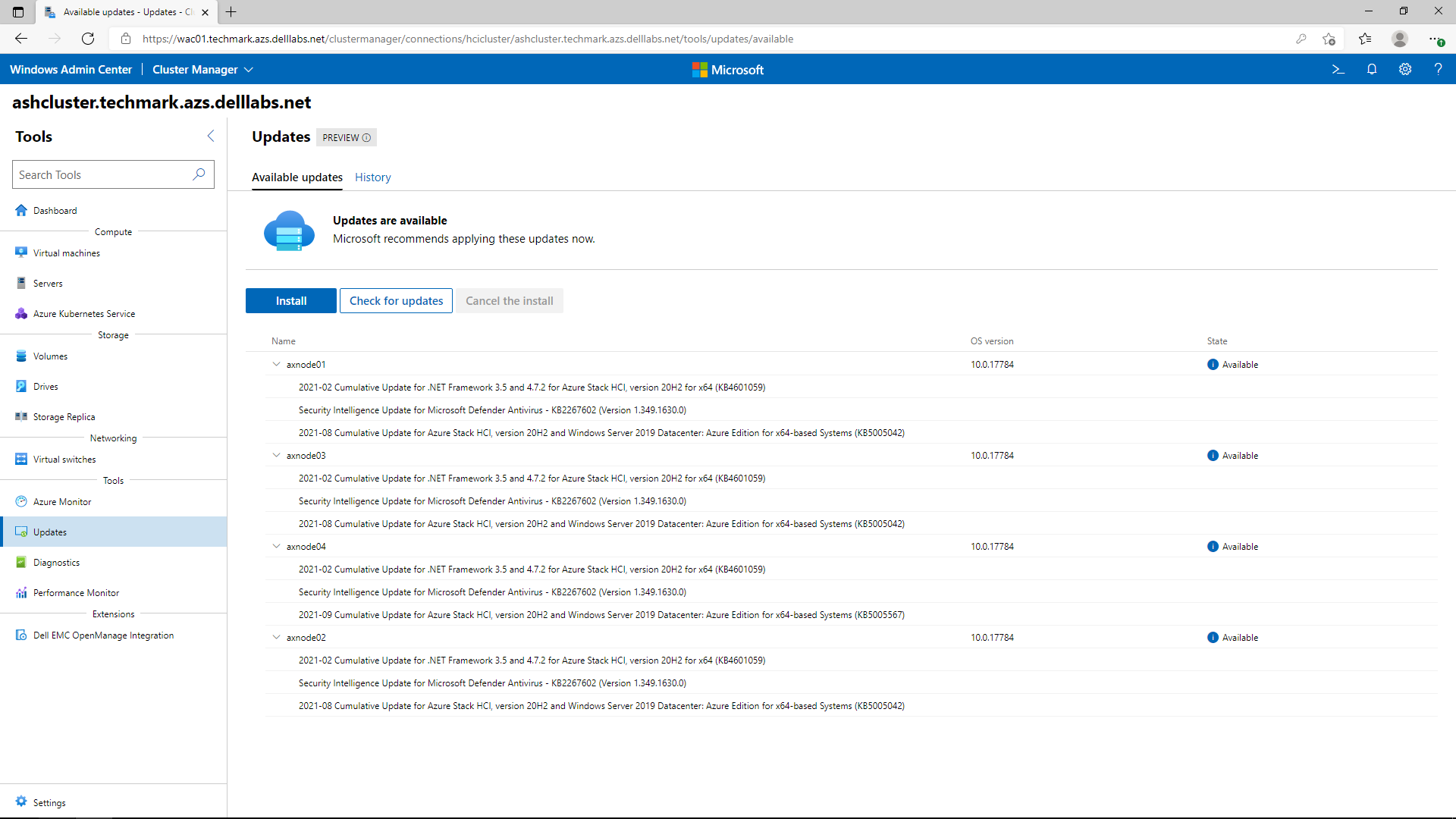
Node validation is performed first before moving forward with hardware updates.
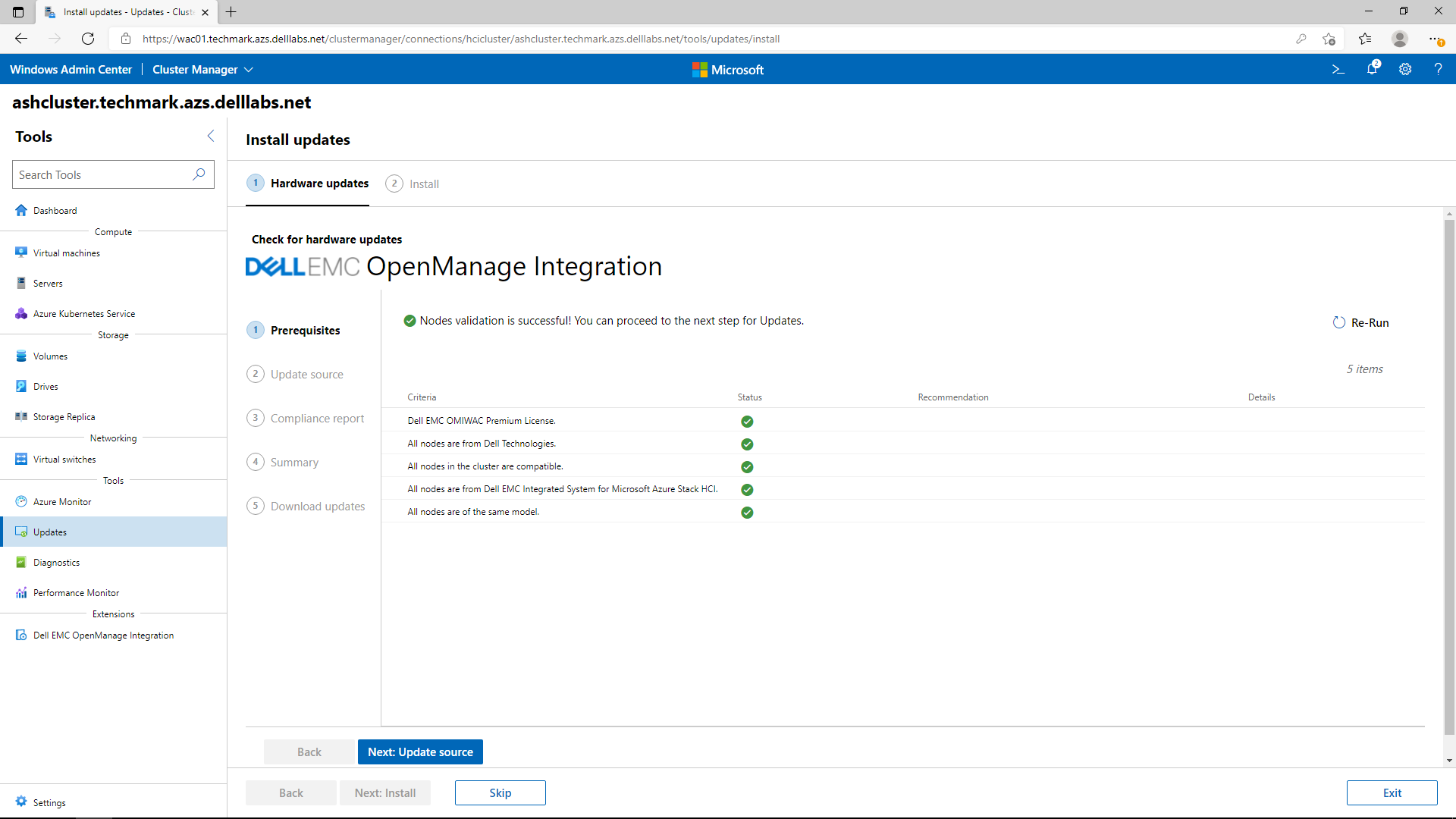
If the Windows Admin Center host is connected to the Internet, the online update source approach obtains all the systems management utilities and the engineering validated solution catalog automatically. If operating in an edge or disconnected environment, the solution catalog can be created with Dell EMC Repository Manager and placed on a file server share accessible from the cluster nodes.
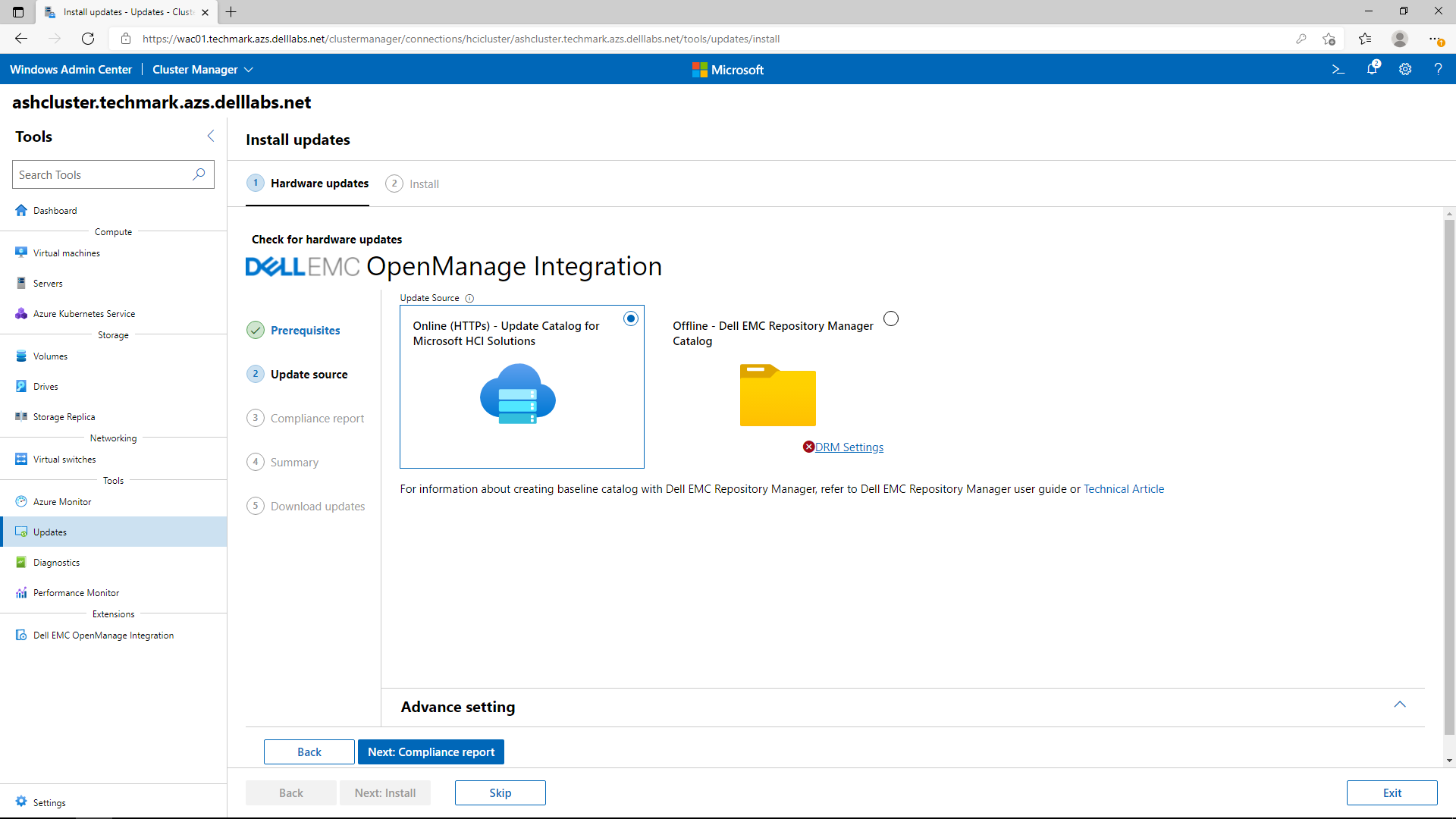
The following image shows a generated compliance report. All non-compliant components are selected by default for updating. After this point, all the OS and non-compliant hardware components will be updated together with only a single reboot per node in the cluster and with no impact to running workloads.
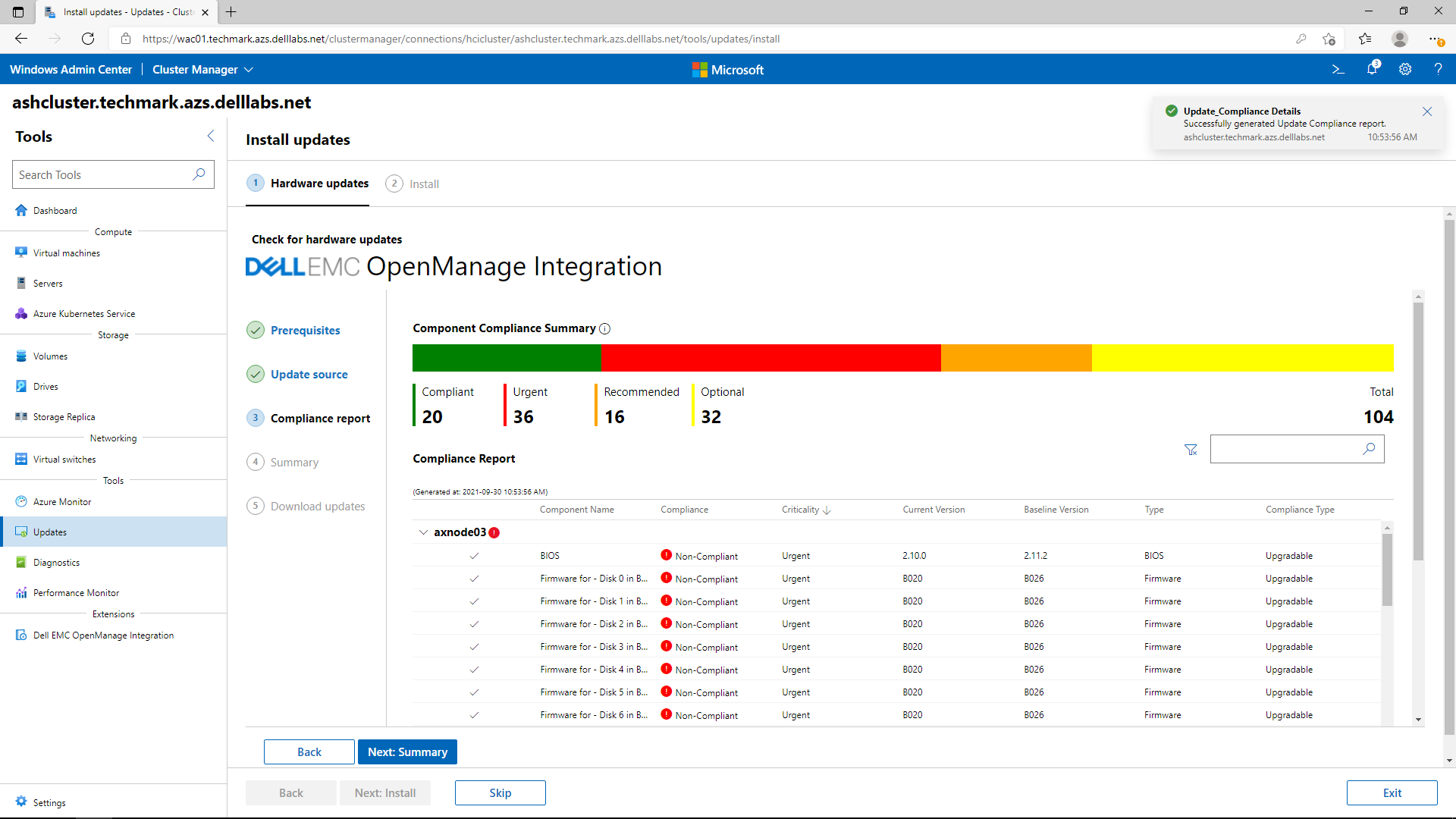
Life is too short to wait for server reboots
Speaking of reboots, Kernel Soft Reboot (KSR) is a new feature coming in Azure Stack HCI, version 21H2 that also has the potential to make my white paper claims even more jaw dropping. KSR will give me the ability to perform a “software-only restart” on my servers – sparing me from watching the paint dry during those long physical server reboots. Initially, the types of updates in scope will be OS quality and security hotfixes since these don’t require BIOS/firmware initialization. Dell Technologies is also working on leveraging KSR for the infrastructure updates in a future release of OMIMSWAC.
KSR will be especially beneficial when using Microsoft’s CAU extension in Windows Admin Center. The overall time savings using KSR multiplies for clusters because faster restarts means less resyncing of data after CAU resumes each cluster node. Each node should reboot with Mach Speed if there are only Azure Stack HCI OS hotfixes and Dell EMC Integrated System infrastructure updates that do not require the full reboot. I will definitely be hounding my Product Managers and Engineering team to deliver KSR for infrastructure updates in our OMIMSWAC extension ASAP.
Bake off rematch
I decided to hold off on doing a new bakeoff until Azure Stack HCI, version 21H2 is released with KSR. I also want to wait until we bring the benefits of KSR to OMIMSWAC for infrastructure updates. The combination of OMIMSWAC 1-click full stack CAU and KSR will continue to make OMIMSWAC unbeatable for seamless lifecycle management. This means better outcomes for our organizations, improved blood pressure and quality of life for IT pros, and more motion-sickness-free adventure vacations. I’m also looking forward to spending more time learning exciting new technologies and less time with routine administrative tasks.
If you’d like to get hands-on with all the different features in OMIMSWAC, check out the Interactive Demo in Dell Technologies Demo Center. Also, check out my other white papers, blogs, and videos in the Dell Technologies Info Hub.

Dell EMC Solutions for Azure Stack HCI Furthers Customer Value
Wed, 16 Jun 2021 13:35:49 -0000
|Read Time: 0 minutes
As customers address the upgrade cycle of retiring Microsoft Windows Server 2008 into software defined infrastructures using Windows Server 2019, the core tenets of hyperconverged infrastructure (HCI) and hybrid cloud enablement continue to be desired goals. Many customers, however, are unsure how to best leverage their investments in Windows Server to modernize their datacenters to take advantage of software defined infrastructure.
At Dell Technologies, we have leadership positions in converged, hyperconverged, and cloud infrastructures covering several platforms, including being a founding launch partner with Microsoft’s Azure Stack HCI solution. Built over three decades of partnership with Microsoft, we bring the insights and expertise to help our customers with their IT transformation utilizing software defined features of Windows Server 2019, the foundational platform for Azure Stack HCI.
Built on globally available and supported Storage Spaces Direct (S2D) Ready Nodes, Dell EMC offers a wide range of Azure Stack HCI Solutions that provide an excellent value proposition for customers who have standardized on Microsoft Hyper-V and looking to modernize IT infrastructure while utilizing their existing investments and expertise in Windows Server.
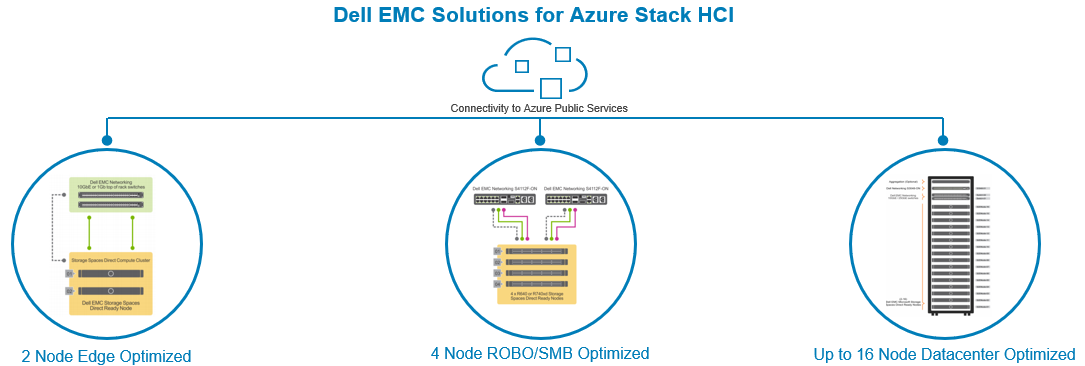
As we head to Microsoft’s largest customer event – Microsoft Ignite 2019 – we are delighted to share some new enhancements and offerings to our Azure Stack HCI solution portfolio.
Simplifying Managing Azure Stack HCI via Windows Admin Center (WAC)
With a goal of simplifying Azure Stack HCI management, we have integrated monitoring of S2D Ready Nodes into the Windows Admin Center (WAC) console. The Dell EMC OpenManage Extension for WAC allows our customers to manage Azure Stack HCI clusters from a single pane of glass. The current integration provides health monitoring, hardware inventory, and firmware compliance reporting of S2D Ready Nodes, the core building block of our Azure Stack HCI solution. By using this extension, infrastructure administrators can monitor all their clusters in real time and check if the nodes are compliant to Dell EMC recommended firmware and driver versions. Customers wanting to leverage Azure public cloud to either extend or protect their on-prem applications can do so within the WAC console to utilize services such as Azure Back up, Azure Site Recovery, Azure Monitor, etc.
Here is what Greg Altman, IT Infrastructure Manager at Swiff-Train and one our early customers had to say about our OpenManage integration with WAC:
"The Dell EMC OpenManage Integration with Microsoft Windows Admin Center gives us full visibility to Dell EMC Solutions for Microsoft Azure Stack HCI, enabling us to more easily respond to situations before they become critical. With the new OpenManage integration, we can also manage Microsoft Azure Stack HCI from anywhere, even simultaneously managing our clusters located in different cities."

New HCI Node optimized for Edge and ROBO Use Cases
Customers looking at modernizing infrastructure at edge, remote or small office locations now have an option of utilizing the new Dell EMC R440 S2D Ready Node which provides both hybrid and all-flash options. A 2-node Azure Stack HCI cluster provides a great solution for such use cases that need limited hardware infrastructure, yet superior performance and availability and ease of remote management.
The dual socket R440 S2D Ready Node is shallower (depth of 27.26 in) than a typical rack server, comes with up to 8 or 10 2.5” drive configurations providing up to 76.6TB of all-flash capacity in a single 1U node.

The table below summarizes our S2D Ready Node portfolio.
R440 S2D RN | R640 S2D RN | R740xd S2D RN | R740xd2 S2D RN | |
Best For | Edge/ROBO and space (depth) constrained locations | Density optimized node for applications needing balance of high-performance storage and compute | Capacity and performance optimized node for applications needing balance of compute and storage | Capacity optimized node for data intensive applications and use cases such as backup and archive |
Storage Configurations | Hybrid & All-Flash | Hybrid, All-Flash, All-NVMe including Intel Optane DC Persistent Memory | Hybrid, All-Flash, and All-NVMe | Hybrid with SSDs and 3.5” HDDs |
For detailed node specifications, please refer to our website.
Stepping up the Performance Capabilities
With applications and growing data analysis needs increasingly driving the lower latency and higher capacity requirements, it’s imperative the underlying infrastructure does not create performance bottlenecks. The latest refresh of our solution includes several updates to scale infrastructure performance:
- All S2D Ready Nodes now support Intel 2nd Generation Xeon Scalable Processors that provide improved compute performance and security features.
- Support for Intel Optane SSDs and Intel Optane DC memory (on R640 S2D Ready node) enable lower latency storage and persistent memory tier to accelerate application performance. The R640 S2D Ready Node can be configured with 1.5TB of Optane DC persistent memory working in App Direct Mode to a provide a cache tier for the NVMe storage local to the node.
- The new all-NVMe option on R640 S2D Ready Node provides a compact 1U node for applications that are sensitive to both compute and storage performance.
- Faster Networking Options: For applications needing high bandwidth and low latency access to network, the R640 and R740XD S2D Ready Nodes can now be configured with Mellanox CX5 100Gb Ethernet adapters. In addition, we have also qualified the PowerSwitch S5232 100Gb switch to provide a fully validated solution by Dell EMC.
As we drove new hardware enhancements to our Azure Stack HCI portfolio, we also put a configuration to test the performance we can expect from a representative configuration. With just a four node Azure Stack HCI cluster with R640 S2D Ready Nodes configure all NVMe drives and 100Gb Ethernet, we observed:
- 2.95M IOPS with an average read latency of 242μs in a VM Fleet test configured for 4K block size and 100% reads
- 0.8M IOPS with an average write latency of 4121 μs in a VM Fleet test configured for 4K block size and 100% writes
- Up to 63GB/s of 100% sequential read throughput and 9GB/s of 100% sequential write throughput with 512KB block size
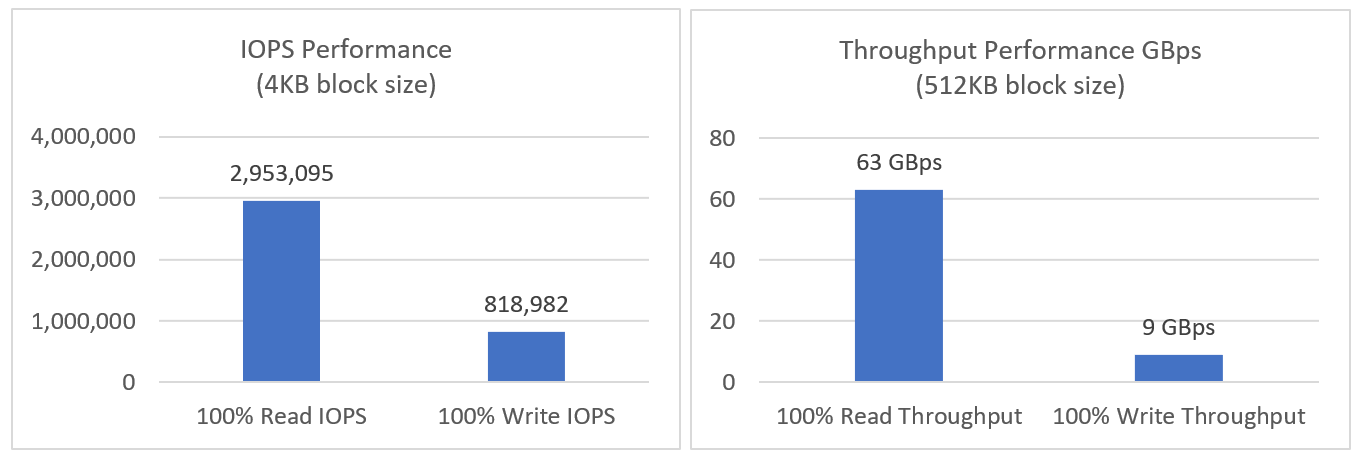
Yes, you got it right. Not only the solution is compact, easy to manage but also provides a tremendous performance capability.
Read our detailed blog for more information on our lab performance test results.
Overall, we are very excited to bring so many new capabilities to our customers. We invite you to come meet us at Microsoft Ignite 2019 at Booth 1547, talk to Dell EMC experts and see live demos. Besides the show floor, Dell EMC experts will also be available at Hyatt Regency Hotel, Level 3, Discovery 43 Suite for detailed conversations. Register here for time with our experts.
Meanwhile, visit our website for more details or if you have any questions, contact our team directly at s2d_readynode@dell.com


